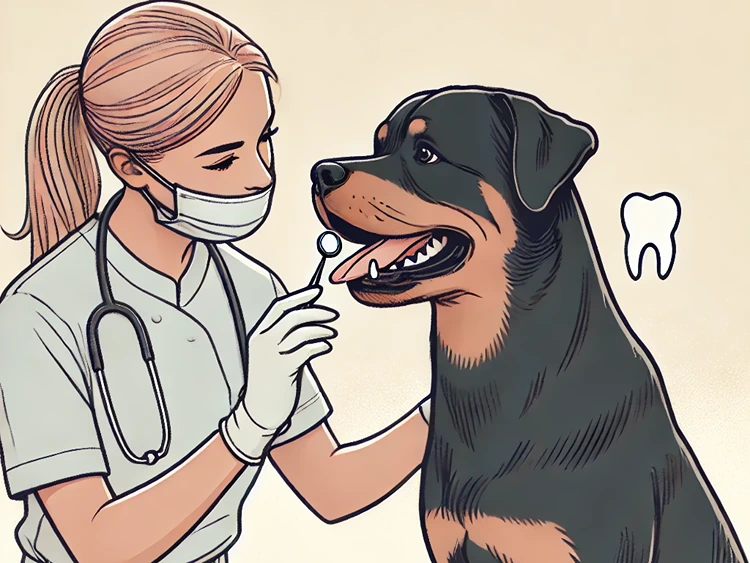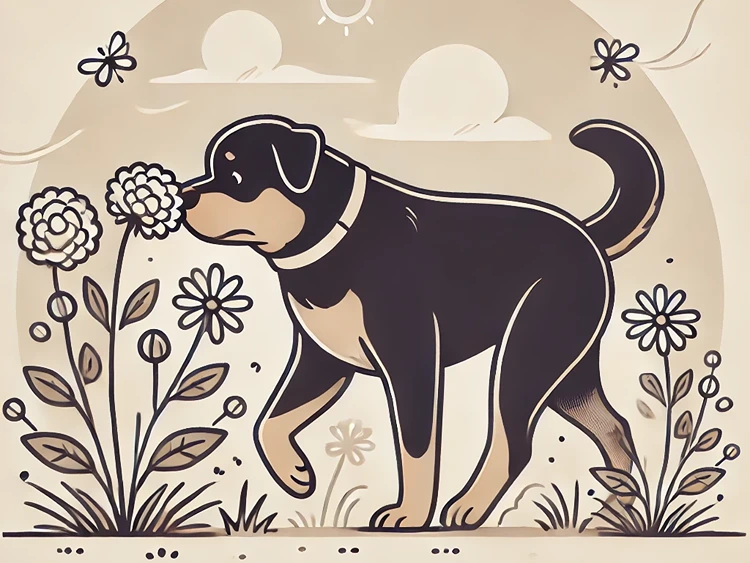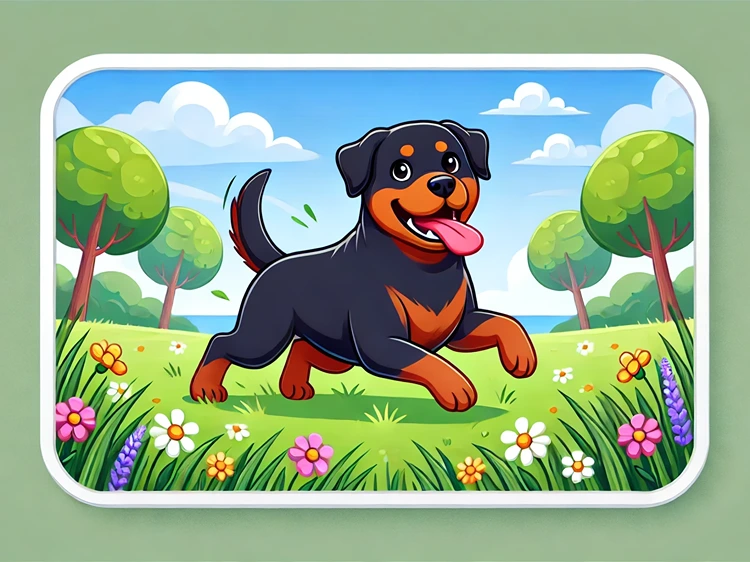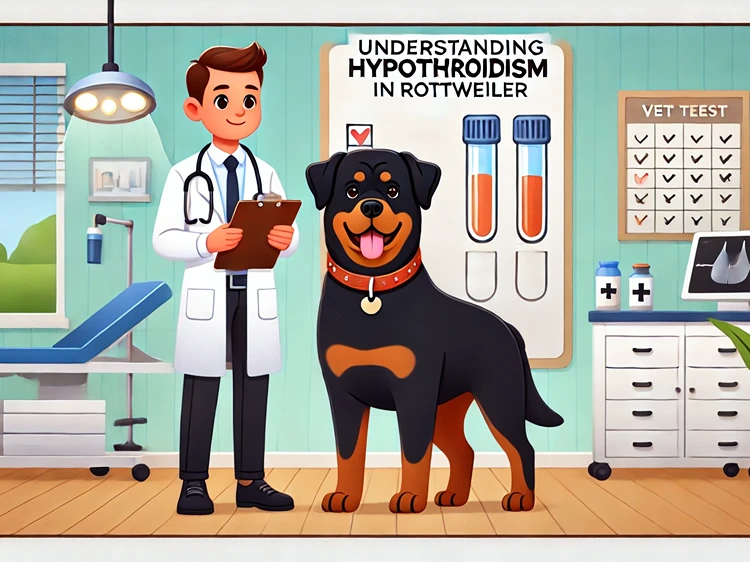When it comes to our beloved Rottweilers, we often think about their strength, loyalty, and protective nature. However, one aspect of their health that often goes unnoticed is dental care. Proper dental care for Rottweilers is essential to ensure they stay healthy, happy, and full of energy. Healthy teeth and gums are not just about a sparkling smile; they play a crucial role in your Rottweiler’s overall well-being. In this article, we’ll explore some essential tips and insights to help you keep your Rottweiler’s teeth and gums in top shape.
Why Is Dental Care Important for Rottweilers?
Many dog owners might not realize the importance of dental care until it’s too late. For Rottweilers, neglecting dental health can lead to a variety of problems, from bad breath to serious infections that can affect their overall health. Just like humans, Rottweilers can suffer from plaque buildup, gingivitis, and even periodontal disease if their teeth aren’t properly cared for. By understanding the importance of dental care, you can prevent these issues and ensure your Rottweiler enjoys a long, healthy life.
What Are the Risks of Poor Dental Care?
Poor dental care can lead to a range of problems that go beyond bad breath. When plaque and tartar build up on your Rottweiler’s teeth, it can lead to gingivitis, which is an inflammation of the gums. If left untreated, this can progress to periodontal disease, which affects the structures that support the teeth. This can result in pain, tooth loss, and even infections that can spread to other parts of the body, including the heart, liver, and kidneys.
Rottie Stats:
According to the American Veterinary Dental Society, over 80% of dogs show signs of dental disease by the age of three. Rottweilers are particularly prone to dental issues due to their strong jaws and tendency to chew on hard objects, which can damage their teeth if not properly cared for.
How Can You Maintain Your Rottweiler’s Dental Health?
Maintaining your Rottweiler’s dental health requires regular care and attention. The good news is that with a few simple steps, you can keep your Rottweiler’s teeth and gums healthy. Here’s what you need to know:
Regular Brushing
Brushing your Rottweiler’s teeth is one of the most effective ways to prevent dental problems. Ideally, you should brush your dog’s teeth daily, but even a few times a week can make a big difference. Use a toothbrush designed for dogs and a toothpaste formulated specifically for canine use. Human toothpaste contains ingredients that can be harmful to dogs, so it’s important to use the right products.
Paw-some Tip:
Start brushing your Rottweiler’s teeth when they are a puppy to get them used to the process. If your Rottweiler is older, introduce brushing gradually by letting them sniff the toothbrush and toothpaste before gently brushing a few teeth at a time.
Chew Toys and Dental Treats
Chew toys and dental treats can help keep your Rottweiler’s teeth clean by reducing plaque and tartar buildup. Choose toys that are designed for dental health and are durable enough to withstand your Rottweiler’s powerful bite. Avoid giving your dog hard objects like bones or antlers, which can crack their teeth.
What Foods Can Help with Dental Health?
Diet plays a significant role in your Rottweiler’s dental health. Certain foods can help keep their teeth clean, while others can contribute to dental problems. Here’s what you should consider:
Dry Kibble vs. Wet Food
Dry kibble can be more beneficial for your Rottweiler’s teeth compared to wet food. The crunchiness of dry kibble helps scrape away plaque, while wet food can stick to the teeth and contribute to plaque buildup. However, it’s important to choose a high-quality kibble that provides the necessary nutrients for your Rottweiler’s overall health.
Healthy Snacks
Incorporate healthy snacks like carrots, apples, and other crunchy fruits and vegetables into your Rottweiler’s diet. These natural treats not only provide essential vitamins and minerals but also help clean the teeth as your dog chews.
When Should You See a Veterinarian for Dental Issues?
Regular veterinary check-ups are crucial for maintaining your Rottweiler’s dental health. Your veterinarian can spot early signs of dental problems and provide professional cleanings that are more thorough than at-home care. But how do you know when it’s time to visit the vet specifically for dental issues?
Signs of Dental Problems
Look out for signs of dental issues in your Rottweiler, such as bad breath, excessive drooling, difficulty eating, swollen or bleeding gums, and loose or missing teeth. If you notice any of these symptoms, it’s important to schedule a veterinary appointment as soon as possible. Early intervention can prevent more serious problems down the line.
Paw-some Tip:
Regular dental check-ups should be part of your Rottweiler’s annual health routine. Ask your vet to check your dog’s teeth and gums during their yearly examination and follow their recommendations for professional cleanings.
How to Make Brushing Easier for Your Rottweiler?
Getting your Rottweiler to cooperate with brushing can be challenging, especially if they are not used to it. However, with a bit of patience and consistency, you can make the process easier and even enjoyable for both of you.
Gradual Introduction
If your Rottweiler is not accustomed to having their teeth brushed, start by introducing them to the process gradually. Let them sniff and lick the toothbrush and toothpaste first. Then, gently lift their lips and touch their teeth with the brush without applying pressure. Over time, they will become more comfortable with the sensation, allowing you to brush more thoroughly.
Positive Reinforcement
Always reward your Rottweiler after brushing their teeth. Use praise, petting, or a small treat to make the experience positive. Over time, your dog will associate brushing with something enjoyable, making them more willing to participate.
How Often Should You Brush Your Rottweiler’s Teeth?
One of the most common questions Rottweiler owners ask is how often they should brush their dog’s teeth. While daily brushing is ideal, it’s understandable that this might not always be feasible. So, what’s the best approach?
Daily Brushing: The Gold Standard
Brushing your Rottweiler’s teeth every day is the best way to prevent plaque and tartar buildup. This routine keeps their teeth clean and helps prevent gum disease, bad breath, and other dental issues. The more often you brush, the less likely your dog is to develop serious dental problems.
Alternatives to Daily Brushing
If daily brushing isn’t possible, aim for at least three to four times a week. This frequency can still significantly reduce the risk of dental issues. On days when you can’t brush, consider giving your Rottweiler dental chews or toys designed to promote oral health. These can help remove some plaque and keep your dog’s mouth cleaner between brushings.
What Are the Best Dental Products for Rottweilers?
Choosing the right dental products for your Rottweiler is crucial for effective dental care. From toothpaste to toothbrushes, here’s a guide to the best options available.
Dog-Specific Toothpaste
Always use toothpaste specifically formulated for dogs. Human toothpaste contains ingredients like fluoride and artificial sweeteners, which can be harmful to dogs if ingested. Dog-specific toothpaste comes in flavors like chicken or beef, making it more appealing to your Rottweiler and easier to use.
Toothbrushes for Large Breeds
For a Rottweiler, you’ll need a toothbrush designed for large breeds. These toothbrushes usually have larger heads and longer handles, making it easier to reach all areas of your dog’s mouth. Some toothbrushes also have angled bristles to clean more effectively.
Dental Sprays and Gels
If your Rottweiler is particularly resistant to brushing, dental sprays and gels can be a helpful alternative. These products are easy to apply and can help reduce plaque and freshen your dog’s breath. However, they should not replace brushing entirely but can be a useful supplement to your dental care routine.
How to Address Bad Breath in Rottweilers?
Bad breath, or “doggy breath,” is often a sign of underlying dental issues. While some odor is normal, especially after eating, persistent bad breath should be addressed to prevent more serious health problems.
Identify the Cause
The first step in addressing bad breath is identifying the cause. In many cases, bad breath is caused by bacteria buildup in the mouth, which can lead to gum disease and other dental issues. However, bad breath can also be a sign of more serious conditions like kidney disease, liver problems, or diabetes. If your Rottweiler’s breath is particularly foul, or if it’s accompanied by other symptoms like vomiting or changes in appetite, consult your veterinarian.
Implement a Dental Care Routine
Regular brushing and the use of dental products can significantly reduce bad breath. Ensure you’re brushing your Rottweiler’s teeth regularly and consider adding dental chews, toys, or water additives to their routine. These products can help control bacteria and keep your dog’s mouth cleaner, reducing bad breath.
Are There Professional Dental Care Options for Rottweilers?
While at-home care is essential, sometimes professional dental care is necessary to maintain your Rottweiler’s oral health. Here’s what you need to know about professional options.
Veterinary Dental Cleanings
Professional cleanings performed by a veterinarian are much more thorough than what you can achieve at home. These cleanings involve scaling (removing plaque and tartar from teeth) and polishing the teeth to prevent future buildup. Your Rottweiler will need to be under anesthesia for this procedure, which allows the vet to clean below the gum line where most plaque and bacteria accumulate.
Rottie Stats:
A study by the American Animal Hospital Association found that dogs that received professional dental cleanings lived an average of 15% longer than those that did not. This underscores the importance of incorporating professional dental care into your Rottweiler’s health routine.
Dental Extractions
In some cases, your Rottweiler may require tooth extractions due to severe decay, infection, or damage. While this may sound alarming, it’s often the best option for relieving pain and preventing further health complications. Your vet will determine if an extraction is necessary and will provide you with aftercare instructions to ensure your dog recovers smoothly.
How to Monitor Your Rottweiler’s Dental Health at Home?
Even with regular brushing and professional care, it’s important to keep an eye on your Rottweiler’s dental health. Regular monitoring can help you catch potential issues early before they become serious.
Check for Plaque and Tartar
Regularly check your Rottweiler’s teeth for signs of plaque and tartar buildup. Plaque is a soft, sticky film that forms on the teeth and can usually be removed by brushing. If not removed, it hardens into tartar, which requires professional cleaning to remove. Tartar often appears as a yellow or brown deposit on the teeth, particularly near the gum line.
Examine the Gums
Healthy gums should be pink and firm. If you notice any redness, swelling, or bleeding, this could be a sign of gingivitis or periodontal disease. It’s also important to check for any signs of pain when your Rottweiler eats or chews, as this can indicate dental problems.
Monitor Eating and Chewing Habits
Changes in your Rottweiler’s eating or chewing habits can also be a sign of dental issues. If your dog is suddenly avoiding hard food or toys, or if they seem to be chewing on one side of their mouth, this could indicate pain or discomfort in their teeth or gums. If you notice these changes, it’s best to consult your veterinarian.
What Are the Long-Term Benefits of Proper Dental Care?
Maintaining proper dental care for your Rottweiler isn’t just about preventing bad breath or keeping their smile bright. The long-term benefits extend far beyond their mouth and can contribute to their overall health and longevity.
Prevention of Serious Health Issues
By keeping your Rottweiler’s teeth and gums healthy, you can prevent the spread of bacteria to other parts of the body. Dental diseases can lead to infections in the bloodstream, affecting the heart, liver, and kidneys. By ensuring your dog’s oral health, you’re also protecting these vital organs.
Improved Quality of Life
A Rottweiler with healthy teeth and gums is a happier dog. Dental pain can make it difficult for your dog to eat, play, and enjoy life to the fullest. By taking care of their teeth, you’re helping them live a more comfortable and active life.
Cost Savings Over Time
Investing time in regular dental care can save you money in the long run. Preventing dental issues reduces the need for expensive treatments like extractions or periodontal surgery. Regular professional cleanings, combined with at-home care, can help you avoid these costly procedures.
Common Dental Issues in Rottweilers and Their Symptoms
| Dental Issue | Symptoms |
|---|---|
| Gingivitis | Red, swollen gums, bleeding during brushing, bad breath |
| Periodontal Disease | Receding gums, tooth loss, pus around the teeth, difficulty eating |
| Tooth Fractures | Broken or cracked teeth, pain when chewing, refusal to eat hard food |
| Oral Tumors | Lumps in the mouth, difficulty eating, persistent bad breath |
| Abscesses | Swelling in the jaw, pus discharge, fever, loss of appetite |
FAQs
Wrapping Up
Dental care for Rottweilers is essential to their overall health and happiness. By incorporating regular brushing, providing the right dental products, and scheduling professional cleanings, you can prevent dental issues that could impact your Rottweiler’s well-being. Healthy teeth and gums are crucial for avoiding serious health problems, enhancing your dog’s quality of life, and potentially extending their lifespan. Remember, a consistent dental care routine is key to ensuring your Rottweiler’s teeth stay strong and healthy for years to come. Don’t wait until problems arise—start prioritizing your Rottweiler’s dental health today to keep them smiling and thriving.




